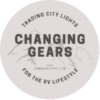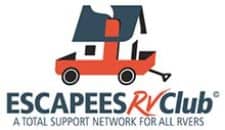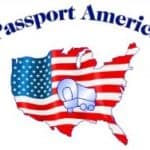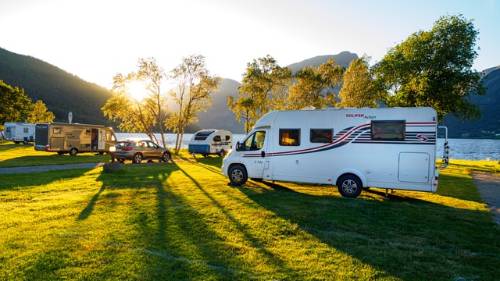Freedom is spelled b-o-o-n-d-o-c-k-i-n-g.
Boondocking is an affordable adventure away from the chaos and cacophony of RV parks, developed campgrounds and urban hideouts.
It’s also known as dry camping.
People boondock for many reasons.
- Some people boondock for the unbeatable scenery and ambiance.
- Others are too thrifty to pay $65 a night for a FHP campsite during the high summer season.
- Sometimes, all your destination campgrounds are booked months in advance, and you’re just desperate.
Welcome to the “other side” of RV travel.
This article is primarily about where to boondock and free overnight RV parking locations.
If it’s your first time camping away from a developed campground, check out our Quick-Start Guide to RV Boondocking!
Be warned: Once you open this door, all other forms of camping will become bland and tasteless. You’ll have experienced camping at its essence.
Some of the product links are on this page are affiliate links. If you click through and purchase, I may receive a small commission at no extra cost to you. See Privacy Policy. Thanks!
Boondocking Apps & Websites
Table of Contents
Where to Go RV Boondocking?
Boondocking takes many forms: Pitching a tent beside a placid lake, parking a motorhome beside Cracker Barrel, or sleeping at a rest stop.
These apps and websites help you find the best places to park overnight. You’ll find every type of campsite imaginable! Many are free or close to it.
(And don’t forget, when in a pinch, Google “free camping near me.” You never know what you might find!)
- After all, who doesn’t want to make camp underneath a Colorado mountain sunset?
- Or set up your rig along Sanibel Island white sand seashores?
- Maybe park your home-on-wheels inside the red rock canyons of northern Arizona?
- Or whip flies over hungry trout mouths in a stream somewhere in the U.P.?
Find your perfect place below!
Campendium
Campendium is a compilation of campground locations, reviews, and photos from fellow RVers and travelers. You can find information on RV parks, free camping, state parks, and more!
Campendium has a standardized rating system that includes the following categories:
- Overall Rating
- Access
- Location
- Cleanliness
- Site Quality
- Noise
- Cellular Signal
One of the most useful features is the Cellular Signal Strength rating, which shows signal strength by the carrier.
Campendium shows Free Camping locations by state. You can browse, search by list, or zoom and pan around a map.
In addition to their website, Campendium offers a free iOS app.
Using Campendium is free. If you want to avoid the advertisements, you can upgrade to a membership account for an ad-free experience and additional features like cell phone coverage maps for $5/month or $20/year.
AllStays
AllStays is one of the most popular camping location websites. The AllStays iOS app has been the #1 Camping App for a decade!
The app doesn’t just show you locations. It gives you the whole kit-and-caboodle:
- Rate range
- Hookups
- Big rigs access
- Tents or no tents
- Club discounts
- Toilets/restrooms
- Pool
- Playground
- Laundry
- Propane
- Pet-friendly
- RV dump station
- Age-restricted
- Boat launch
- Internet access
And AllStays isn’t just for boondockers. The service has information on campgrounds, hotel lodging, truck stops, rest areas and more.
AllStays operates eight (8) apps on the iOS marketplace.
You can also sign up for their Pro subscription, which is optimized for PC/Mac desktop and also works on mobile and tablet devices. It provides a veritable flood of information: road hazards, nearby places, map layers, RV dumps, propane refillers, free camping locations and more.
Sign up for their Pro account here. It’s less than $3/month!
Harvest Hosts
Harvest Host is the bourgeoisie (“bougie”) side of boondocking. The company has partnered with more than 2,500 wineries, farms, breweries, golf courses, farms, museums and attractions to offer free overnight parking for RVers and travelers.
When you camp at a Harvest Host location, you’re in for a memorable experience! “Interacting with the Hosts and supporting them … is an integral part of the Harvest Hosts program,” says the company.
You’ll get to enjoy farm tours, wine tasting, museum attractions and more. And if you ask, you might even get to volunteer!
These locations are exclusively available only to members of Harvest Hosts. Advance reservations required.
Harvest Hosts is a single-night overnight stay program open to most types of self-contained RVs. Generally, you’ll come prepared with your own water and power.
A Harvest Hosts membership costs $99 a year. Use it twice, and you’ve paid it back! The +Golf package is an additional $40. You can download their Google Play and Apple iOS apps for free once you join.
RVers swear by Harvest Hosts. Join Harvest Hosts here.
Boondockers Welcome
Boondockers Welcome is a people-helping-people kind of website. As their website says, “Free overnight RV parking on private property … Locals invite travelers to spend the night, share their stories, and save their money for the real adventure.”
These host locations are exclusively available only to members of Boondockers Welcome who drive self-contained RVs (no tents, minivans, rooftop tents, etc.)
Most host sites include electric power; some even come with full hookups! Some locations offer driveways, others offer actual level concrete or gravel pads with a scenic, private view.
A $50 annual membership opens the door to more than 3,000 locations. A membership grants you unlimited stays, free boondocking ebooks, and other special perks and discounts at affiliated programs.
Beyond that, the program is free! A host will never charge you for a night’s sleep.
You can browse host locations and peruse host profiles before signing up. Join here!
Free Campsites.net
Freecampsites.net is one of the OGs of the boondocking world. It’s a user-driven platform where real travelers submit free camping and parking information. When you find an unlisted campsite, you can submit it for review yourself!
Most of the listed campsites are free. A few paid, permit or research sites are also listed and are marked separately.
Freecampsites.net is a great resource for finding dispersed camping on public lands, such as BLM, WMA, and National Forest land. While these campgrounds are available to all, large rigs or compact street cars may have a difficult time accessing the more remote locations.
FreeCampsites.net is a web browser-based service. Find sites by searching and panning on a zoomable map. And you can take advantage of their trip planner to find campsites along your route, too.
Ultimate Campgrounds
The mission of Ultimate Campgrounds is to provide “the most comprehensive and most accurate information about public campgrounds of ALL types.”
Along with the GPS location, you’ll find out about local regulations, hookups, nearby towns, weather, and real campsite photographs.
Not all listed campgrounds are RV-accessible. A few can’t be accessed by anything but a boat or on foot! However, all are publicly available. Many, but not all, are free.
UC shows campgrounds operated by state parks, state forests, national parks and national forests, Bureau of Land Management, and many other government agencies. Their database contains more than 42,000 entries!
You can access Ultimate Campgrounds in three ways. The browser is free; the apps are paid ($3.99). The apps have limited offline useability.
- Web browser
- Android and iOS apps
- Garmin GPS
Free Roam
Free Roam is the new kid on the block. It’s a non-profit 501(c) “seeking to connect campers with nature in a sustainable way.”
Free Roam intertwines camping and boondocking with a love for nature and even a little bit of a social network. The company has big plans to promote sustainability, launch cleanup initiatives, and advocates Leave No Trace principles.
The service is a compilation of free and paid campgrounds at both public and private locations. The online zoomable map has many handy features and filters, such as Rig Length, Crowdedness, Elevation, Facilities Nearby, Carrier Coverage, etc.
In addition to the site searches, Free Roam has forums, chat rooms, a trip planner, a personalized history of places, and several other features.
You can get FreeRoam via their browser-based app, Google Play app, or Apple iOS app. All are free!
Frugal RV Travel
Frugal RV Travel is run by long-time boondocker and expert traveler Marianne Edwards. If your camping destination is the American Southwest anywhere between California and Texas, check out her series of boondocking eBooks.
You can view her eBooks here. We highly recommend them!
Even if you don’t purchase her eBooks, visit the website, Frugal-RV-Travel.com. You’ll find boatloads of free resources and recommendations.
Edwards is an expert in low-cost RV travel. If you want to go full-time but are afraid of the costs, check out her six (6) Frugal Shunpiker’s RV Travel Guides. Many full-time RVers swear by them. And they come with a 60-day money-back guarantee.
Fun fact: Edwards is also the original brain behind Boondockers Welcome!
The Dyrt
At heart, the Dyrt is a crowdsourced encyclopedia of campground locations and reviews. It’s not just for RVers. Whether you’re looking for tents, trailers, RVs, or cabins, the Dyrt has something for you.
The Dryt has an extremely active and local user community. You’ll find some of the most up-to-date reviews and site pictures here! The company also publishes an online magazine, runs a community forum, and offers a trip planner.
The Dyrt Pro is a $35.99/year membership that unlocks quite a few premium upgrades. You get a trip planner, additional map filters and layers, discounts at more than 1,000 campgrounds, discounts on outdoor gear, offline map access and search, and more.
ParkAdvisor
Looking for commercial RV parks? Look no further RV Parks & Campgrounds by Park Advisor.
Similar to other resources, RV Parks & Campgrounds is a free web-based map search tool. Unlike other resources, Park Advisor doesn’t discriminate. It shows commercial RV parks, public parks, military campgrounds, KOAs, retirement communities, rest areas, fuel stops, overnight parking spots and more. The map is fairly comprehensive and shows user reviews as well.
Using the web browser is free. Or you can download free iOS or Android apps, or a premium paid iOS app that shows additional search filters.
Free Camping on Public Lands
Here’s more information on the types of campgrounds and sites available for overnight RV parking and RV boondocking.
Federal Government Land
The Federal Government owns a whopping 640 million acres of land in the United States! In other words, Uncle Sam owns more than one out of every four acres.
Federal lands are found in every state. You’ll find mountains, forests, deserts, waterways, rangelands, and more.
Various departments and their agencies share ownership. Here are the major players:
U.S. Department of the Interior
- Bureau of Land Management (BLM)
- U.S. Fish & Wildlife Service
- National Park System (NPS)
Department of Agriculture
- US Forest Service (USFS)
U.S. Department of Defense
- Army Corps of Engineers
Federal lands are managed by various purposes. Most are multi-use. Here are some common purposes for federally-owned lands:
- Recreation
- Historical preservation
- Ecological conservation
- Power generation
- Agriculture
- Ranching
- Mining
- Timber
Let’s take a look at where some of the best boondocking opportunities can be found. Hint: It’s not at your local National Park! In fact, free camping opportunities usually dry up within a park’s boundaries. And most opportunities require a permit.
Also, you can start your search with the Recreation.gov website. It’s your hub to find and reserve your site. You can search from over 113,000 locations from 12 federal participating partners.
Free Camping on BLM Land
Let’s start by looking at BLM land. BLM land is all over the country, although most is in the Mountain and Intermountain west. In some states, the BLM owns more land than any other entity!
[BLM infographic]
The BLM extends extremely generous opportunities for dispersed camping. Here’s their policy: “Most of the remainder of public lands are open to dispersed camping, as long as it does not conflict with other authorized uses … Dispersed camping is allowed on public land for a period not to exceed 14 days within a 28 consecutive day period.”
Also, the BLM maintains affordable developed campgrounds all over the country. Most are simple affairs with a few pull-in sites, each with a fire ring and picnic table. Thankfully, most have pit toilets but no dump stations or other services. Some have freshwater access.
Free Camping on National Forest Land
Beyond BLM land, the second most popular option for boondocking is on National Forest land administered by the U.S. Forest Service. In fact, if you live in the eastern half of the United States, you have a lot more opportunities on National Forest land.
Rules for dispersed camping varies by National Forest district. Most share these regulations:
- Leave no trace! Leave only footprints; take only pictures.
- No camping within 100/200 feet of a water source/road/administrative site
- Must relocate 5 miles within 14/16 day period.
- No campfires/use only existing fire rings
- Properly dispose of human waste
- Extremely large groups require permits
Generally, National Forests in rural areas are more lenient and may allow dispersed camping almost anywhere. In other areas, dispersed camping may only be allowed within certain sub-sections of certain districts. Permits are usually not required, but check local regulations.
State-Owned Land
A fair chunk of the land in any state is owned by the State government: state parks, state forests, state shores and beaches, conservation areas, wildlife refuges, etc.
If you look hard enough, you can find free or cheap camping opportunities in virtually every state in one or more of these locations – but rules vary across state lines!
As a rule, the closer you get to a big city or national landmark, the harder it is to find free camping. After all, these places attract lots of tourists, and the local campgrounds lobby to ensure that free camping isn’t easily available – they want you to pay them!
Also, free public camping in dense agricultural areas can be a challenge. No one wants you driving into the middle of a cornfield!
That’s why boondocking in the Mountain West, following the spine of the Rockies from Montana through New Mexico, is a piece of cake. Free camping opportunities are literally endless!
Moochdocking: A Frugal Camping Alternative
The following moochdocking guest post was written by Dora and Ed Elliot of ItsAGoodLifeRV.com.
The term “moochdocking” sometimes carries a negative connotation, making travelers a bit hesitant to give it a try. But, it’s really just a practical, frugal alternative that allows you to stay connected to others.
What Is “Moochdocking”?
How Is It Different than Boondocking?
Boondocking = camping for free at all types of off-the-beaten path locations, such as federal and local parks, public beaches, welcome centers, trailheads, and more. It’s the opportunity to camp off-grid for a few days or weeks at a time at no cost. When you’re boondocking, you’re not connected to any services (i.e., electric, sewer or water), that’s why some people refer to it as primitive camping. Boondocking is sometimes a necessity when you are far from the next campground and snowy, windy or stormy conditions loom and you need to wait it out.
Moochdocking = reconnecting with family and friends, and spending a few days parked at their place. The most common example is a quick visit to a friend or relative along your travel route. You spend the night or a few days parked in their driveway or somewhere designated on their property. If you’re fortunate, you may be able to connect to their electricity and fill up your fresh water tank.
Top 5 Advantages of Moochdocking
1. Reunification
The number one benefit of moochdocking is the opportunity to reconnect with family and friends. One of the most difficult emotional challenges for full-time RVers is the physical distance between them and their relatives and good friends. Moochdocking allows you to stay as connected as you wish to be by stopping periodically and catching up, without wearing out your welcome.
2. Safety
Moochdocking is generally much safer than boondocking, which happens in remote places with minimal or no security, no quick access to medical care for emergencies, risk of forest fires, and unpredictable and sometimes dangerous wildlife.
3. Accessibility
When you are boondocking there are places to stay that are big rig friendly, others are more suitable to smaller RVs or a van. Getting to some remote sites may also require you to traverse difficult-to-navigate routes that are not always friendly to your tow vehicle or RV. With moochdocking there is normally sufficient hard-surface space in someone’s driveway, lot or on another part of their property suitable for rigs of all sizes.
4. Communication
Boondocking sites are often in very remote locations. That means there’s no guarantee you’ll have cell service, and definitely no access to WiFi for internet access. Moochdocking locations are generally in town or at someone’s home in the country where cell service is readily available. And, you may be able to borrow free guest access to your host’s internet service.
5. The Price
It’s FREE. In many cases, driveway surfing also gives you access to household amenities like hot showers, a washer and dryer, and family dinners.
To make your visit a win-win experience for you and your host, remember your moochdocking etiquette.
- Leave the place as clean or cleaner than when you arrived.
- Don’t impose on the host’s personal space.
- And, most importantly, show gratitude.
Ways to show your appreciation can be simple things, like sharing a household chore (e.g. washing the dishes, helping cook a meal, doing an extra load of laundry), sharing a dessert, gifting a handmade craft, or personalizing a thank-you card.
Want to learn more about living and working the RV lifestyle? Check out Dora and Ed’s blog, swag store and YouTube channel at It’s a Good Life with Dora and Ed.
Free RV Parking at Private Businesses
Walmart
Walmart boondocking – known as “Wallydocking” – is, well, kind of the armpit of boondocking.
(Actually, parking directly beside a 5000-Kelvin street light at a Pilot gas station surrounded by the clatter of a dozen diesel engines and trying to sleep next to an I-70 overpass is the armpit of boondocking. Ask me how I know).
However, it’s unbeatably convenient. Pull into any one of the 4,000 Walmarts in the country from April to November, and you’re almost guaranteed to see an RV or camper hiding out on the fringes of the parking lot.
However, there are a lot of unwritten rules around Wallydocking (see Boondocking Etiquette below).
For one thing, not all Walmarts allow overnight parking. Discretion is often left up to the store manager. When in doubt, call ahead, and ask for the store manager. Explain you’re traveling through and would like to park for the night.
And city ordinances may prohibit overnight camping anywhere authorized within the city limits. Roll the dice, and you might drive out of the parking lot at 3:30 a.m. with a citation in your glovebox.
Oh, and go buy something, will ya? Here’s what Corporate Walmart has to say: “Walmart values RV travelers and considers them among our best customers.” To read the official WallyPolicy on overnight parking, go here.
Kmart
If you’re lucky enough to pass by one of the 21 remaining Kmarts (as of March 2021), then why not pull in? Discretion for overnight parking is generally left to the store manager, and with parent company Sears still embroiled in Chapter 11 bankruptcy, what have they have to lose?
Sam’s Club
Sam’s Club has an official policy on overnight parking for vehicle stays. You can read it here. “Parking policies may vary from club to club due to local zoning restrictions. You should verify with the Club Manager if it is permissable to use the parking lot for any overnight vehicle stays.”
So fair warning! You could get towed if you wind up on the wrong side of the law.
Costco Club
Most Costco stores allow overnight RV parking. However, local ordinances come first. If the Costco does allow boondocking, the area is usually reserved for RVs and is well-lit. If a security guard is posted, introduce yourself!
You’ll be alone in the parking lot except for restocking employees. Don’t count on quiet, though, as delivery trucks will be meandering through all night.
Home Depot
Like many large retailers, Home Depot doesn’t necessarily mind if you park overnight. However, since many cities have banned overnight parking in a misguided attempt to combat homelessness and itinerancy,
Also, Home Depot doesn’t necessarily own all of its parking lots. Like other Big Box stores, the building supplies retailer may rent or sell portions of their parking lots to smaller nearby businesses. BoondockersBible offers a few more words of wisdom on the subject, including to park inconspiculously and leave early in the morning to leave room for shoppers and contractors!
Lowe’s
Similar to Home Depot, Lowes doesn’t have any express policy prohibiting overnight parking. In fact, you’ll often find semi-trucks and other transportation vehicles parked for a few hours in the wee morning hours. However, it’s always best to call ahead, since some parking lots are actively patrolled by city ordinance enforcement.
Menards
Menards is a popular Big Box store in the Midwest and Eastern U.S. Overnight parking is allowed subject to the permission of the local store manager and city ordinance. Show your thanks with a quick shopping trip. In addition to home improvement materials, Menards sells snacks, summer living products and household goods, so stop in and show some love!
Elks & Moose Lodges
If you’re a member of the Benevolent and Protective Order of Elks or Loyal Order of Moose, you’re in luck! Many lodges offer overnight accommodations to their members. Some even come with hookups! Many sites are free or only ask for a donation.
Cracker Barrel
Overnight parking at Cracker Barrel is affectionately known as “CrackerDocking.” Generally, subject to local store rules, overnight parking is allowed and even encouraged.
However, the etiquette is a little bit different than, say, WallyDocking. Cracker Barrel is a restaurant, and you should be respectful of that. That means you should park only in their reserved RV space, and if they’re full, then park your 40-ft Class A somewhere else.
Cracker Barrels usually operate from 7:00 a.m. to 10:00 p.m. That means your guaranteed some nighttime quiet hours, but it also means you should avoid pulling in during the early evening and stealing customer space.
There are over 650 Cracker Barrel locations around the country. It ain’t just a Southern thing! Most are conveniently located off major interstates and highways. And best of all, before you turn in for the night or set out for the day, you can enjoy a full meal of home cookin’!
Pro Tip: Use Google Satellite view to check ahead for designated RV spots in their parking lots.
Camping World
Does Camping World allow overnight RV parking? Yes*. (That’s an asterisk, and it’s because not ALL locations allow overnight camping).
Camping World used to encourage overnight RV parking (so long as it was just one night), but with Camping World becoming more of a dealership than a parts store, the company has moved away from this policy. In many locations, Camping World may forbid parking, which fences and gates to prove it. As always, call ahead to confirm local policy.
Bass Pro Shop
Oftentimes, you’ll find decent overnight parking outside of a Bass Pro shop. If the Bass Pro is associated with a mall, however, you might be accosted by mall security.
Be sure to show some love by outfitting yourself for your next outdoor adventure!
Cabela’s
Beloved store of outdoorsmen and sportsmen, Cabela’s generally allows overnight parking subject to local restrictions.
In fact, many have specific parking areas for RVs and allow overnight stays. Some even have dump stations!
And of course, you should stop inside and check out the gear: fishing rods, camping tents, insect repellent – Cabela’s has it all.
A great resource to plan ahead your Cabela’s stays is the Boondocker’s Bible. As always, best to err on the side of caution and plan ahead.
Casinos
Can you park your RV overnight at a casino? Yes! In fact, there’s a whole website dedicated to this underground camping: Casino Campers. You can check out their RV-friendly casino map here. And if you know of one yourself not listed, join up and add your favorite find to the list! Generally, you are not required to gamble, and most have 24/7 security.
Churches
Never assume a church allows overnight RV parking. However, if you call ahead, you’ll find that many pastors don’t mind if you park your rig for a few hours to catch some sleep.
If they say no, don’t berate or ask why. Politely accept their answer and move on. Churches may be concerned about the security and liability of allowing unknown vehicles onto their lots.
Truck Stops (Loves, Pilot, Flying J, TA)
Nothing beats the accessibility of a good ol’ fashioned truck stop for a sleep quickie. Don’t steal space away from the truckers, of course. Try to arrive early in the evening and find a quiet spot away from the diesel clatter and the security lights. Sadly, truck stops are usually loud and brightly lit. On the good side, they offer showers, snacks, and other convenient items.
24/7 Fitness Centers (Planet Fitness, SNAP Fitness, etc.)
We recommend you avoid overnight parking at 24/7 fitness centers. Overnight parking of any sort is not allowed. Also, fitness centers have no allocated parking for RVs. You’ll stick out like a sore thumb, and you’ll have no excuse when a security guard comes knocking 45 minutes after you’ve fallen asleep.
State Rest Areas
Most rest areas have signs stating, “No overnight camping.” But does that mean they do not allow overnight parking?
No. In fact, almost all states allow “overnight parking” at rest stops – so long as overnight parking is defined by getting a good night’s sleep and then moving on. Staying for longer than 8-12 hours in most rest areas will get you a knock on the door from highway patrol.
Some states that expressly ban overnight RV parking in rest areas include::
- Colorado
- South Carolina
- North Carolina
- Maryland
- Nebraska
- Tennessee
- Virginia
Stealth Camping
Stealth camping is the quasi-legal side of boondocking. What’s to prevent you from pulling up to a random suburban street (one without “No Parking” signs, of course) and catching some Z’s?
Well, city ordinances, for one thing. But stealth camping is all about parking inconspicuously on public streets so no one thinks twice about your presence.
Obviously, this is darn near impossible with a Class A motorhome or fifth wheel trailer. So most stealth campers use Sprinter Vans, Class C motorhomes, slide-in truck campers, etc.
Keep your car keys and flashlight near by in class law enforcement comes knocking and asks questions.
Boondocking Etiquette Rules
To channel my inner authoritarian parent: “Boondocking is a privilege. If you don’t treat it right, you’ll face the consequences!”
There’s nothing worse than a lazy, dirty boondocker. Just as all tent campers and backpackers practice Leave No Trace principles, so should all RV owners.
Here are the Commandments of RV Boondocking. These are the Etiquette Rules of the Road, just applicable to exploring the backcountry as Wallydocking.
Follow them, and you – and everyone around you and after you – will have a great experience.
Etiquette When Primitive Camping
The Golden Rule of primitive camping or dry camping in the outdoors is to Leave No Trace. You can learn all about LNT principles at LNT.org. Here’s a summary for RV enthusiasts:
No Littering!
Keep America Beautiful! No one wants to see your trash, whether it’s plastic or a banana peel. Litter kills wildlife and ruins the scenery.
No Dumping
What you carry in, you carry out. Don’t dump, flush or rinse waste tanks. Avoid dumping gray water, as it contains surfactants and chemicals from soap and cleaners that can damage plant life and leach into groundwater sources.
Travel on Durable Surfaces
When driving a motorized vehicle, stay on designated forest service roads. Prefer asphalt to gravel, gravel to dirt. Don’t drive off-road or through sensitive areas, such as bogs, swamps, and desert surfaces.
When camping, choose durable surfaces like mature forest floors and flat stone. Avoid waterways, swamps, bogs, marshes, desert surfaces and reclamation land.
And remember, tow trucks don’t service the Great Outdoors. If you get stuck, you might stay stuck. So don’t plunge ahead if you’re not confident you can back out.
Respect the Wildlife
This is their home, not yours. You’re a guest. Keep a reasonable distance, and know the minimum distances for different species (25 years from most wildlife, 100 yards from predators). Do not disturb the animals. Your presence is stressful and can disrupt their natural rhythms.
Minimize Fire Impact
Save the bonfires for your backyard barbeque. Use a fuel-powered camp stove when possible (or when required by law). When a campfire is allowed, use existing fire rings and only harvest downed timber.
On the rare occasions when a campfire is both necessary and allowed, build the campfire as small as possible, use dead timber, and don’t collect rocks for a fire ring. The burned rocks will scare the landscape for years to come.
Leave What You Find
Leave the gift of discovery to those who come after. Don’t take rocks, plants, archeological artifacts or other objects of interest.
Look After Your Pets
Follow the same rules as if you were camping in a neighbor’s backyard: clean up their waste, keep them reasonably quiet, don’t let disturb neighboring animals, and don’t chain them up outside to howl while you explore the nearby trails.
Stay Out of Your Neighbor’s Bubble
Give your neighbors their privacy. If you can hear their every-day conversations, you’re too close. If you’d feel disturbed if they were shirtless, you’re too close.
Don’t Disturb the Peace
Refrain from running a generator if you’re within half a mile of another camper, and abide by common-sense quiet hours. Don’t blare music or make loud sounds, like fireworks or gunshots. Boondocking is not the place to practice clay pigeon shooting.
Don’t Block the View
Don’t park next to or in the middle of scenic landmarks such as arches, waterfalls, meadows, and so forth. Camp discreetly so all can enjoy the surrounding natural beauty without having to photoshop your RV out of it.
Etiquette when Urban Boondocking
Don’t Set Up Shop
Don’t deploy your jacks, extend your slide-outs, turn on your awning lights, or God forbid even set up camping chairs and tiki torches!
Stay One Night Only
Get in; get out. Staying more than one night is an invitation for a security guard to come knocking.
Remain Quiet as the Grave
Don’t blare music, let your dogs bark, invite your friends over, or keep the RV rockin’. No one should guess your RV is even occupied.
Give the Shop Your Business
Show your thanks by shopping at the locale and spending some money (and keep the receipt in case anyone comes knocking).
Leave When Asked
Someone might ask you to leave. Politely explain the reason for your stay, apologize for any hassle, pack up and be on your way in 60 seconds.
Andy Herrick is a blogging nerd, #8 Enneagram, wannabe bread baker, INTJ, RV industry professional, and small business entrepreneur. He can be found hanging out with his lovely wife and family, skiing, cycling, climbing, hiking, and convincing anyone who will listen why dogs aren’t really that great of pets. Also, he runs this website.










